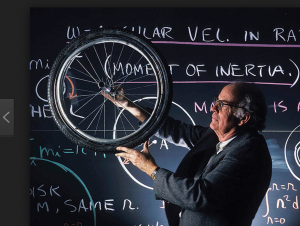 As I clean up the 24 inches of snow delivered by Blizzard Jonas it is easy to ponder our human vulnerabilities. Amazingly, our weather prediction systems are so accurate that Jonas was detailed almost perfectly for all to avoid and survive. We humans seem to do well with fast changing situations like this, but for some reason we can’t effectively react to slow changes.
As I clean up the 24 inches of snow delivered by Blizzard Jonas it is easy to ponder our human vulnerabilities. Amazingly, our weather prediction systems are so accurate that Jonas was detailed almost perfectly for all to avoid and survive. We humans seem to do well with fast changing situations like this, but for some reason we can’t effectively react to slow changes.
 Reminds me of annual raft trips on the “killer” Kern River my wife and I used to share with friends. Lots of fun, nothing bad ever happened. That is, right up until the high water year when a class five rapid hole sucked in our six person raft and threw us all out like we were rodeo clowns thinking we could ride a bull. Funny how nobody mentioned going back in following years.
Reminds me of annual raft trips on the “killer” Kern River my wife and I used to share with friends. Lots of fun, nothing bad ever happened. That is, right up until the high water year when a class five rapid hole sucked in our six person raft and threw us all out like we were rodeo clowns thinking we could ride a bull. Funny how nobody mentioned going back in following years.
For years the late Professor Al Bartlett wrote and taught on this phenomenon, at the University of Colorado. His book, The Essential Exponential!:  For the Future of Our Planet, details why we humans fail,until it is too late, to understand slow moving exponential changes like population growth. It isn’t that we don’t see the numbers, it is just that our brains cannot comprehend them. An example is comparing a million dollars to a trillion dollars. That a trillion is a million million is not understandable unless we break it down into other more understandable factoids. Using $100 bills, $1 billion is ten truck pallets stacked five feet high, but 10,000 of these pallets is too large to comprehend. As this web site shows well, if the $19 trillion national debt would be laid in a single line of $1 bills, it would stretch from Earth, past Uranus, or a set of $100 bill pallets bigger than the buildings on Wall Street.
For the Future of Our Planet, details why we humans fail,until it is too late, to understand slow moving exponential changes like population growth. It isn’t that we don’t see the numbers, it is just that our brains cannot comprehend them. An example is comparing a million dollars to a trillion dollars. That a trillion is a million million is not understandable unless we break it down into other more understandable factoids. Using $100 bills, $1 billion is ten truck pallets stacked five feet high, but 10,000 of these pallets is too large to comprehend. As this web site shows well, if the $19 trillion national debt would be laid in a single line of $1 bills, it would stretch from Earth, past Uranus, or a set of $100 bill pallets bigger than the buildings on Wall Street.
But what of this human challenge? Does it really matter? Yes! – to everything that is important to our lives as humans on this planet! An example is my newly discovered favorite TED talk, forwarded to me by Eric Gruenloh, one of this blog’s commenters. This talk, Governments Don’t Understand Cyber Warfare, We Need Hackers, by cybersecurity analyst Rodrigo Bijou, describes why governments are not capable of dealing with the pace of cyber threats and the rate of change of information technologies that underpin cyber threats…
Rodrigo makes the point, from his younger perspective, that today’s information technology empowered global citizens have power and potential that world governments can’t comprehend nor control. He points out, quoting from the U.S. Director’s of National Intelligence annual Worldwide Threat Assessment, that cyber didn’t show up as the top threat until 2013 where it remains today. He says we can no longer separate online and offline terrorist attacks… As an example this image of the baby’s hand showing the French slogan, “de Suis Charlie” (my name is Charlie), which came to symbolize the right of free speech following the January 7 th, 2015 terrorist attacks on Paris, went viral on social media. Because the image was embedded with malware, it took only 6 days to deploy a global attack on every computer where it was viewed.
th, 2015 terrorist attacks on Paris, went viral on social media. Because the image was embedded with malware, it took only 6 days to deploy a global attack on every computer where it was viewed.
Rodrigo’s central argument is that in this digital age, individuals have more power than ever and they can help, working in concert with governments, to create better security and prosperity for all people. He goes on that because governments are slow moving the have shown the inability to adapt and learn… “It’s not what governments can do, it is that they can’t.” Governments, he argues, need to give up power and control in order to work together with IT empowered people. Rather than fighting for things like encryption back doors governments should not be fearful of new technologies like TOR and Bitcoin which will continue to grow, independent of government controls. Instead, governments should embrace these new technologies because they offer the possibility to help billions of people across the planet to share their knowledge and production toward a better future…
In my opinion, this is a younger person’s perspective that should be given a lot of consideration as we humans continue to misunderstand change!

Great blog as always Marv. Governments are what they are… slow to change. Let’s say for sake of discussion that governments born of constitutions like ours acknowledge what they are, throw up their hands, and cease trying to retain control as the TED talk suggests. Hackers aren’t presented with an option of jail or NSA. Would governments no longer bring bad actors employing the digital space to justice, or would governments move to lower the current standards of evidence? The smoking gun could be established by inference, without evidence of communications let alone the actual communications content supporting charges of conspiracy. Wouldn’t the governments deprived of back doors reallocate those resources to bolster other means of monitoring (e.g. nanotechnologies) and interdiction at the peer-to-peer level?
Joe, good comments but I understood Rodrigo to say that governments should understand that they can’t stay ahead of cyber nor can they effectively hold it back so they should leverage the power of the people to make life better for all. And yes, governments must continue to find ways to enforce laws and protect their citizens. I do think that governments will have to find ways to work in a world with powerful encryption they can’t break and monetary systems like Bitcoin that they won’t be able to control.
Good topic Marv. Your insight is valued very much. I would offer an analogy between Operating Systems and Governments. Both off a longer term stable frameworks or eco systems that allow essential things to grow and hopefully flourish. Both are essential for stability, necessarily slow to change and both have flaws that can be exploited by those with malicious intent. Both require some form of protection through laws, devices, procedures and some form of punishment for offenders. I agree with your conclusion, that like organized crime and corruption in government we will have to live with some level of vulnerability. Perfection is likely not a possibility, but I do believe the benefits far outweigh the risks.
Marv,
Great article and thoughts as always. Seems like we should be adopting an all of the above strategy rather than an either or strategy. Yes we should accept that these technologies probably can’t be controlled but we should strive to be as smart and innovative as the “bad-guys”. The Govt should be doing more to recruit the younger more flexible minds right out of high-school as these are the folks really driving innovation in Cyber. STEM initiatives are great but only address the learning side, not the what to do after side. If we were doing more to bring the Cyber-smart youth in, through industry and govt programs (work study, etc), perhaps we could get them more involved so when they graduate they step into a job working for “the good guys”. We also should look to incentivize or require this type of activity from industry like we do in encouraging the use of small business.
Best,
Dave
Thanks Dave, good ideas. Our generation needs to help seed these ideas among the institutions that we support.